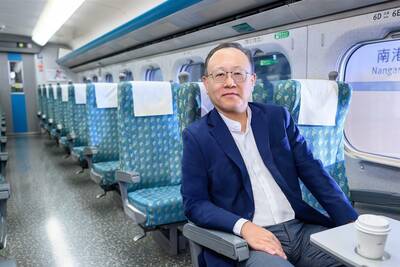Introduced to Japan nearly a hundred years ago, the Taiwanese lily — Lilium formosanum — has become a symbol of the Ghost Festival in Japan.
The first foreign botanist to discover the beauty of the Taiwanese lily was Reber Fortune, a Scottish botanist who came to Taiwan after the port in New Taipei City’s Tamsui District (淡水) opened to foreign trade in 1860, said Lo Ming-yung (駱明永), who has been advocating for the restoration of the Lilium formosanum species for years and for it to be designated the national flower.
Fortune was also known as the man who smuggled 20,000 Chinese tea seedlings to Darjeeling, India, he said.
During the Japanese colonial era, the Taiwanese lily was considered a patio plant or cut flower and brought to Japan, Lo said.
Data published by Japan’s National Institute for Environmental Studies on invasive species in Japan show that the Taiwanese lily arrived in Japan in 1923 or 1924, he said.
Later, the Taiwanese lily was grown along Japan’s highways in large quantities, Lo said.
Taiwanese lilies are strong and love sunshine, making them good representations of the perseverance of Taiwanese, he added.
While he was traveling in Tokyo last month, Lo said he saw Taiwanese lilies in Rikugien, in Ueno Park, and in a private garden next to the Tokyo Tower, among other places.
Taiwanese lilies can be found not only across Japan, but also in South Africa and in Australia, he said.
Upon learning that Lo saw Taiwanese lilies at Ueno Park, calligrapher Chen Shih-hsien (陳世憲), who was in Japan to open a calligraphy exhibition, invited the daughter of the late Taiwanese independence advocate Huang Yung-chun (黃永純) to search for Taiwanese lilies in the park.
Huang’s children are strong like the Taiwanese lilies that spread to Japan 100 years ago, Chen said.
Huang, who graduated from National Taiwan University’s College of Law, was believed to have been blacklisted by the then-Chinese Nationalist Party (KMT) government because of his participation in Taiwanese independence movements in Japan in the 1960s.
According to local reports, he could not return to Taiwan and was almost deported from Japan, where he eventually changed his name and made a living by working at a laundry store and working as an interpreter.

The inspection equipment and data transmission system for new robotic dogs that Taipei is planning to use for sidewalk patrols were developed by a Taiwanese company, the city’s New Construction Office said today, dismissing concerns that the China-made robots could pose a security risk. The city is bringing in smart robotic dogs to help with sidewalk inspections, Taipei Deputy Mayor Lee Ssu-chuan (李四川) said on Facebook. Equipped with a panoramic surveillance system, the robots would be able to automatically flag problems and easily navigate narrow sidewalks, making inspections faster and more accurate, Lee said. By collecting more accurate data, they would help Taipei

STATS: Taiwan’s average life expectancy of 80.77 years was lower than that of Japan, Singapore and South Korea, but higher than in China, Malaysia and Indonesia Taiwan’s average life expectancy last year increased to 80.77 years, but was still not back to its pre-COVID-19 pandemic peak of 81.32 years in 2020, the Ministry of the Interior said yesterday. The average life expectancy last year increased the 0.54 years from 2023, the ministry said in a statement. For men and women, the average life expectancy last year was 77.42 years and 84.30 years respectively, up 0.48 years and 0.56 years from the previous year. Taiwan’s average life expectancy peaked at 81.32 years in 2020, as the nation was relatively unaffected by the pandemic that year. The metric

TAKING STOCK: The USMC is rebuilding a once-abandoned airfield in Palau to support large-scale ground operations as China’s missile range grows, Naval News reported The US Marine Corps (USMC) is considering new sites for stockpiling equipment in the West Pacific to harden military supply chains and enhance mobility across the Indo-Pacific region, US-based Naval News reported on Saturday. The proposed sites in Palau — one of Taiwan’s diplomatic allies — and Australia would enable a “rapid standup of stored equipment within a year” of the program’s approval, the report said, citing documents published by the USMC last month. In Palau, the service is rebuilding a formerly abandoned World War II-era airfield and establishing ancillary structures to support large-scale ground operations “as China’s missile range and magazine

Passengers on Taiwan High Speed Rail (THSR) will be required to use headphones and make phone calls in gangways under new “quiet travel” rules starting Sept. 22. THSR Chairman Shih Che (史哲) told media that THSR will run a three-month promotional campaign to ensure widespread adoption of the new rules. Those repeatedly ignoring the guidance face the potential termination of their transport contract, which can result in them getting escorted off the train, according to THSR. Shih shared his hope to cultivate an environment conducive to rest and reading for the train’s passengers, stating that these changes aim to “promote self-discipline” among passengers